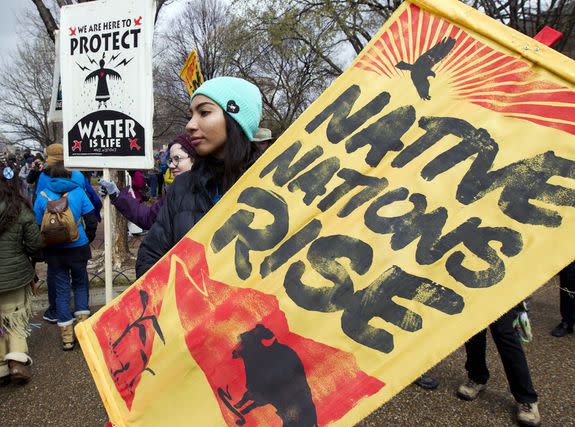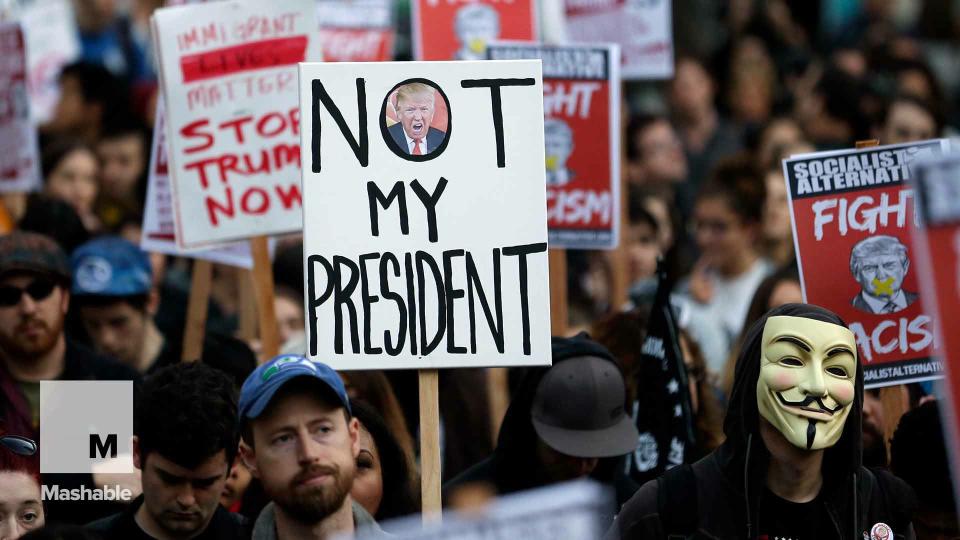Dakota Access Pipeline protest movement now focuses on the money

It’s been a tough few months for opponents of the Dakota Access Pipeline (DAPL). First Donald Trump officially approved the $3.8 billion project. Then indigenous people were forced to clear out of the Oceti Sakowin and Sacred Stone protest camps. And with construction done, oil has now begun flowing from North Dakota to Illinois.
But the opposition has not faded away.
In fact, it's entering a new phase by moving from the plains of North Dakota into city councils and corporate boardrooms. And its indigenous leaders are scoring big victories. They’ve convinced cities to divest billions of dollars in their portfolios from Wells Fargo, which is financing about 5 percent of Dakota Access. Several major European banks have also dropped investments in the project.
SEE ALSO: 9-year-old girl seeks clean air for her generation, sues Indian government over pollution
The protest camps at the Standing Rock Indian Reservation “planted seeds in thousands upon thousands of people’s moral sensibilities,” said Jackie Fielder, a 22-year-old indigenous activist.
She’s now fighting to get San Francisco to divest: “I don’t think [the DAPL opposition] is nearly over. It’s multiplying.”
The DAPL divestment movement may foreshadow similar protests to come against the Keystone XL Pipeline project, which President Trump also green-lit, and other infrastructure that would increase planet-warming greenhouse gas emissions.
Fielder was born and raised in Long Beach, California. But she has deep ancestral ties to the land and water Standing Rock protesters are fighting to protect. She’s an enrolled member of North Dakota’s Three Affiliated Tribes – and is also descended from the Cheyenne River Sioux Tribe, a key leader in the Dakota Access opposition.

Image: AP/REX/Shutterstock
Fielder traveled to the Sacred Stone camp last December. “When I left I decided I wanted to do something,” she said. “It wasn’t clear what that was going to be.”
The answer came to her in early February. That was when Seattle’s City Council decided to cut its $3 billion worth of financial ties to Wells Fargo. “We are taking a bold policy step today,” said Councilmember Lorena Gonzalez. It was the result of a campaign led by Matt Remle, a member of the Standing Rock Sioux tribe, along with other activists.
Seattle was then followed by the cities of Davis and Santa Monica, California, which together pledged to withdraw more than $1.1 billion from Wells Fargo.
Fielder was watching all this unfold in San Francisco, where she had recently graduated from Stanford University. “I was like, ‘we gotta do this,’” she said.
Fielder made inquiries among local indigenous groups. Were any of them running divestment campaigns? Did they have any interest in starting one? But many of the groups seemed too busy to take it on. So she decided to create her own.
“With the energy and time I have as a young person,” she said, “it seemed like I could actually take this up.” With the blessing of older activists, Fielder contacted people across the Bay Area on social media. And in late February, several dozen activists made the case for divestment at a San Francisco Board of Supervisors meeting. On March 14 Fielder’s “Defund DAPL” coalition won its first victory. The Board passed a resolution pledging to explore the feasibility of divesting from companies with ties to Dakota Access.
It was a promising start. Fielder and her fellow activists are now pushing the city to officially drop its $1.2 billion in pipeline-related investments. One way San Francisco might do that is by forming its own municipal bank.
In the meantime, other activists are pressuring city councils in Los Angeles, Raleigh, New York, Chicago, Bellingham, Albuquerque, and Portland to take action. The Dutch financial giant ING and the Norwegian pension fund KLP have sold off their investments in Dakota Access, and were followed earlier this month by the French bank BNP Paribas SA.

Image: AP/REX/Shutterstock
A coalition of investors worth $653 billion is standing in solidarity with the Standing Rock protesters. And a social media campaign to get individuals to pull their savings from banks financing the pipeline has so far added $79 million to divestment efforts.
In late April, Fielder and other indigenous activists took their case directly to Wells Fargo’s annual shareholder’s meeting in Florida. “I’m the product of what happens when you protect the water,” she said, before being escorted out by security.
Yet none of the activities has had a discernible financial impact on Dakota Access or the banks still funding the project. The company building it, Energy Transfer Partners, expects the pipeline to eventually be transporting up to 570,000 barrels of oil per day.
With the Trump administration doing all it can to support the pipeline, and the courts seemingly
reluctant to stand in favor of indigenous rights, Fielder acknowledges that the odds are stacked against the Dakota Access divestment movement. Yet she sees it as a way for regular people across the U.S. and the world to communicate a wider message of protest.
“Divestment is a people-powered intervention in the market,” Fielder said. “It’s actually willing into existence a new world where we don’t depend on fossil fuels.” She sees this as her way of fighting back against the centuries of repression that indigenous peoples have suffered from the U.S. government.
“This is not just a financial stance but also moral stance. It’s hard to put a dollar price on living up to your morals."
WATCH:


